Related Content
Content
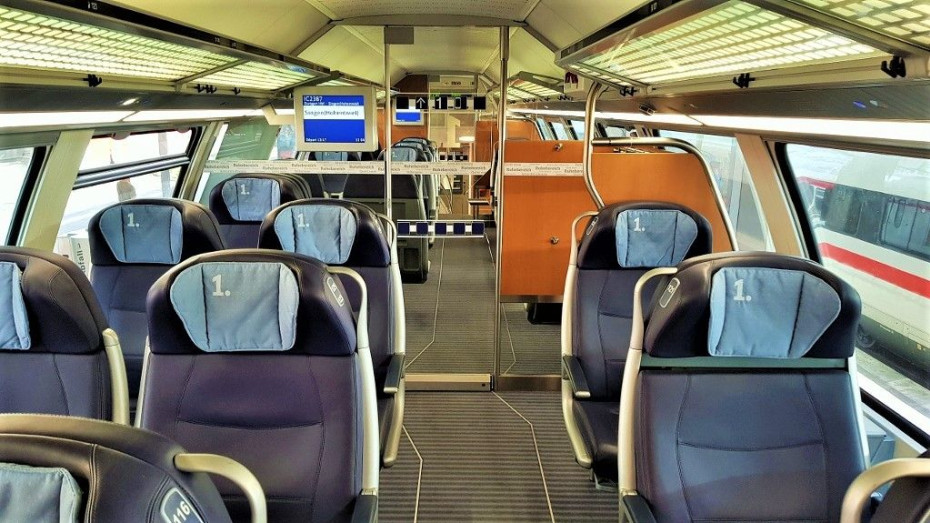
First Class travel on European trains
Is First Class worth it on European trains is a commonly asked question. Though due to the varieties of enhanced comfort and on board service, it doesn't have a definitive answer, but more often than not, it will be a yes.
Share
There are huge variations between the travel experience in First Class on European trains, so multiple factors need to be considered when attempting to provide an answer to the question, ‘Are First Class train tickets worth the money?’
These factors include:
- The price difference between 1st class and 2nd class tickets, which can vary from a few €s to more than €40; when looking up a departure the cheapest type of tickets can be sold out in 2nd class, but still be available in 1st class.
- The trains being used on a route, the difference between 1st and 2nd class tends to be more obvious on the trains used for long-distance express services, than on regional trains.
- What additional extras are included when booking First Class tickets; these can range from a three-course hot meal to nothing at all.
- Whether the first class tickets have more flexible terms for exchanges and refunds than second class tickets.
What to look out for when booking:
As with the prices of many 2nd class tickets, the prices of 1st class tickets can vary hugely according to demand; cheaper prices can be available on different dates, and on your travel date the prices can also vary between departures.
So it can pay off to make a comprehensive search for the best deal; I recently spent more than an hour tracking down the cheapest possible First Class price for a train journey from the Scottish Highlands to London.
The variations between the prices of First and Second Class tickets don’t always mirror each other, if you see a good Second Class price, don’t assume that the cheapest possible First Class price will be available for the same departure.
Particularly keep this in mind on booking services on which the 1st class price is sold as an added extra to the Second Class price.
Booking First Class tickets can actually be great value for money.
That ticket from Scotland and London cost £14 more than a Second Cass ticket, but it included complimentary food and drink throughout the journey, which would have cost in excess of £14 if each item had been purchased at the on board bar counter.
Users of First Class Eurail and Interrail passes save more in comparison to the ticket costs than users of Second class rail passes.
Children can travel for free, at various ages, when travelling with Adult ticket purchasers on many European trains and this also applies when an adult books first class tickets; so don’t assume that first class will be an adults only travel environment, particularly when travelling at weekends and during school holidays.
The common benefits:
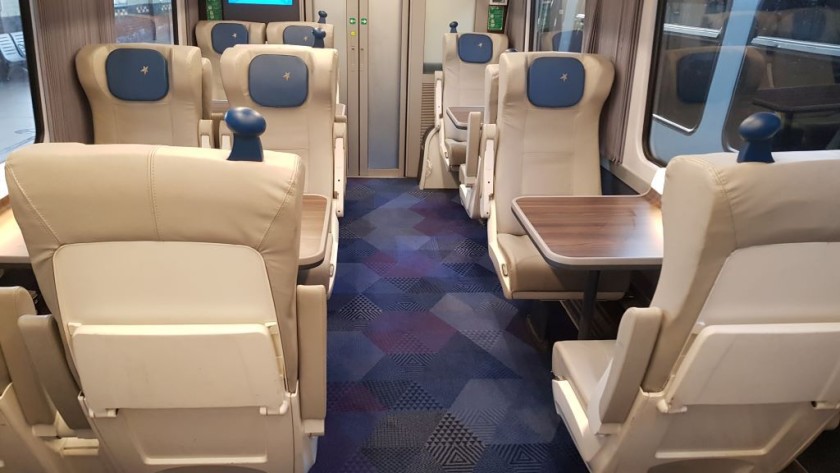
Travelling in first class is also the only means of accessing these travel benefits; when they are available on a route:
- Travelling in single seat with no other traveller beside you; the seats in the first class areas on most European express trains are arranged 1 + 2 across the aisle.
- Wider more comfortable seats
- More space between seats
- Not having to leave your seat in order to obtain hot food.
- Access to passenger lounges at stations; though in some countries including France, these are now only accessible to bookers of the equivalent of Business Class tickets.
Less obvious benefits of travelling first class can include:
- More space in which to store luggage
- Access to enhanced Wi-Fi
- More power sockets, including USB sockets
- An increase likelihood of being sat at a table.
- A higher possibility of finding available seats when travelling on trains on which reservations are not available, or are optional.
On regional trains the difference between second and first class can seem marginal, but what you are partially paying for by booking first class tickets, is the increased likelihood of finding a seat at all.
When travelling with my 75 year old mother I spent €4 more for each of us for a journey from Vicenza to Venice on a Regionale train, and it paid off because we were able to find seats on a train on which second class was standing room only, so the €8 of additional cost was worth every cent.
I have travelled on more than a dozen ICE trains when using first class Interrail passes and have only been unable to find a seat for one short section of one journey.
On the slow trains on scenic routes, first class can seem an expensive luxury, but it can pay off when crossing a near empty carriage / coach, in order to make the most of the scenery on both sides of the journey.
Catering in First Class
There can be a misconception that first class tickets include a meal service, but this isn’t always the case on European trains.
When an at-seat meal service is available there can also be variations as to whether it is included in the ticket price, or whether any items of food and drink that are ordered have to then be paid for.
Also on some trains a complimentary breakfast will be available, but no meals will be served at other times.
Hence this breakdown of whether a catering service is or isn’t included in the price when booking first class tickets; and whether any catering is available at all.
Complimentary meal service included in the ticket price:
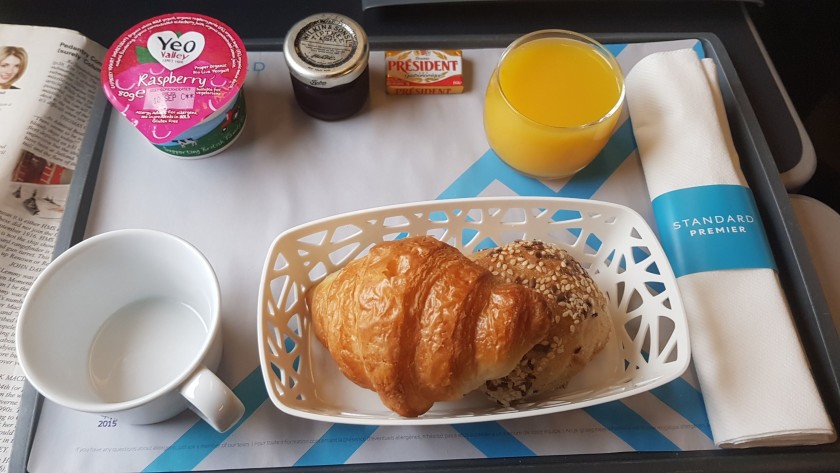
This service is available on these trains:
- Avanti Pendolino (GB)
- Avanti Super Voyager (GB)
- AVE, on Monday to Friday (Spain)
- CrossCountry Voyagers (GB)
- EIP (Poland)
- Euromed, on Monday to Friday (Spain)
- Eurostar (international)
- Frecce trains, in Executive Class (Italy)
- GWR IET (GB)
- LNER Azuma (GB)
- LNER Intercity 225 (GB)
- Regiojet, in Business Class (Czechia and international)
- Snabbtag; breakfast only (Sweden)
- SuperCity (Czechia)
- TGV Lyria; when travelling Business Class (international)
- Thalys, in Premiére Class (international)
and on the TFW Rail trains on the North Wales ↔ South Wales route.
Uses of first class rail passes, who have paid the mandatory reservation fees (which are not required on the British trains) will also be served the complimentary catering.
Non complimentary access to an at-seat meal service
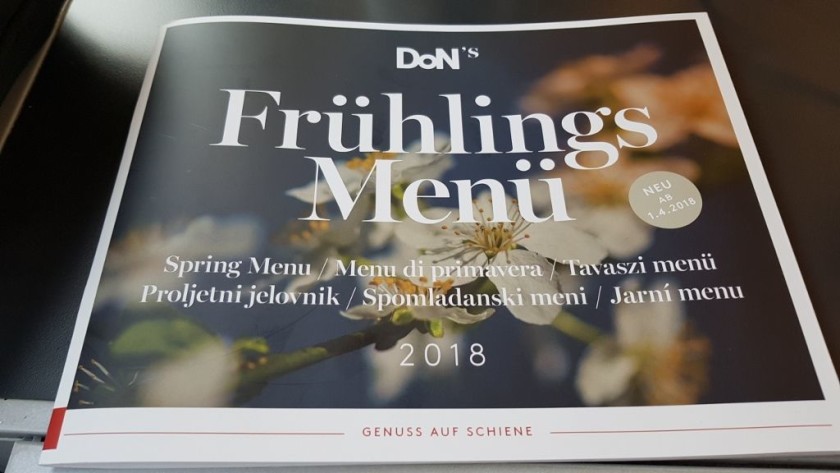
On these trains the full restaurant menu can be ordered from on-board attendant, who will then deliver the food/drink to your seat:
- Raiijet (Austria and international)
- Railjet (Czechia and international)
- EC Astoro, (Switzerland ↔ Italy some departures
- EC Giruno, (Switzerland ↔ Italy) some departures
- EIC (Poland)
- ICE trains (Germany and international)
- DB-SNCF services, the TGV and ICE trains (France ↔ Germany)
On these trains the catering attendant will likely pass through the train asking passengers if they want to order a coffee or other drink, but this is an opportunity to request other items.
Or a chain reaction occurs in which passenger will order a meal and then other travelers respond to this when they see the meal being served.
But on other journeys which SMTJ has experienced, the catering attendant has been out-of-sight and therefore out-of-mind; there will be usually be a button available which can be used to summon the catering attendant, so if you want to order a meal, don’t be afraid to push it.
On the Nova trains operated by TPE in the UK, passengers travelling first class can order sandwiches, snacks and drinks, from a catering service which is not available to second class passengers.
Complimentary welcome drink /snack service:
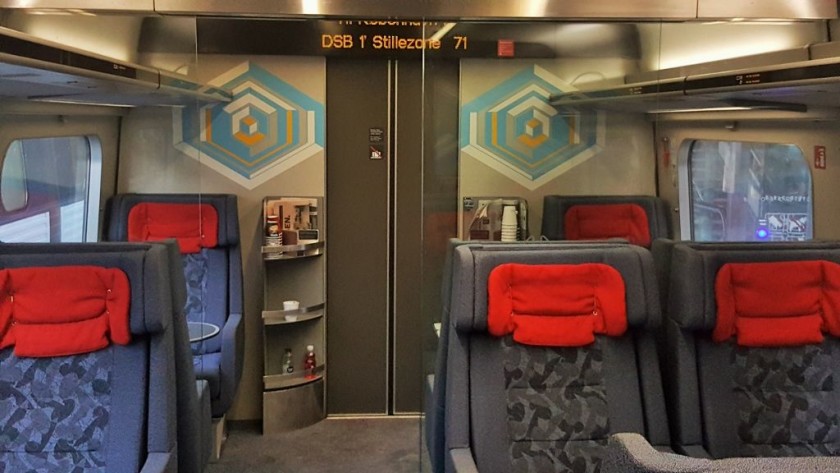
This service is available on these trains:
- EC Berlin Warszawa Express (international)
- Frecce trains, in Business Class (Italy)
- Grand Central Adelante (GB)
- EMR Meridian (GB)
- Greater Anglia Intercity (GB)
- IC/EC (Denmark ↔ Germany)
- Italo, in Prima and Executive class (Italy)
- Lyn (Denmark)
- Regiojet, in Relax and Standard Astra Class (Czechia and international)
- Regiontog, some routes (Norway)
- ScotRail Inter7City (GB)
- Snabbtag (Sweden)
On the Danish, Norwegian and Swedish trains, there will be either a help-yourself drinks service, or travelers will be issued with vouchers which can be used at a bar counter, but on the other trains the catering attendant will pass through the train,
No complimentary catering benefits:
Note the trains missing from those lists above include:
- the TGV trains in France the InterCity (IC) services in France, Germany and Switzerland
- Alfa Pendular and Intercidades trains in Portugal
- the InterCity (IC) services in France, Germany and Switzerland.
The Swiss IC trains convey restaurant cars, so if you want to have a meal during a journey you can save money by booking second class tickets and then travelling in the restaurant car for most of your journey.
On some trains, not included on the above lists, the passengers in first class will be able to order and pay for items from a catering trolley, which can be taken through the train, but the same items and prices will also be available to travelers in second / standard class.
First class travel per country:
The first class travel experience will be specific to each type of train, so these summaries per country are intended to give an overall insight into what travellers can expect from the 'superior' travel experience.
Austria
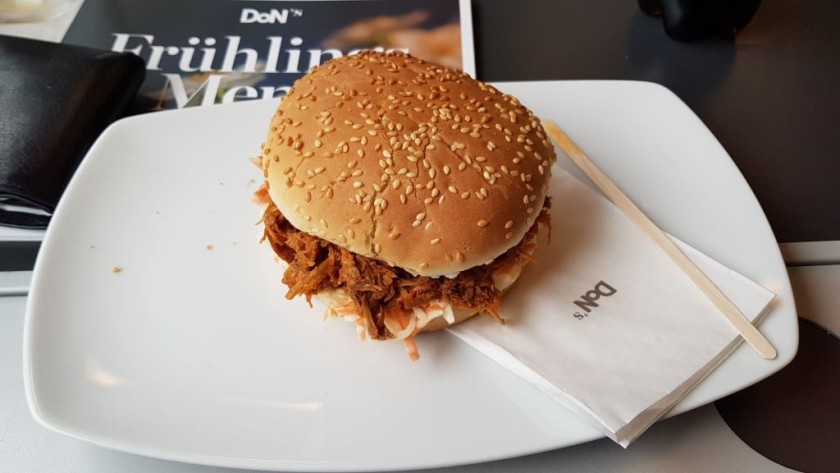
Virtually all Austrian express train services are now handled by Railjets on both RJ and RJX services.
On the Railljet trains the first class benefits include:
- reclining seats
- power sockets at every seat
- access to on board entertainment portal + Wifi
- more luggage storage space
- a quiet zone; the standard / second class seats don’t have one
- the full on-board restaurant menu can be ordered from the attendant and delivered to your seat; though no food and drink is complimentary.
Though one unusual aspect of the first class seating saloon is that comparatively few seats are at tables.
Also first class ticket holders can access station lounges.
When booking tickets on the OBB website, you can choose to add ‘First Class’ as an extra feature, and doing so has a fixed price of €10, €20 or €30 which is priced according to demand, as well as the length of the journey.
This first class upgrade rate can also be out of sync with the Standard Class prices, which are the only prices initially shown.
A more expensive Standard Class departure can have a 1st class upgrade price of only €10, while a departure with a cheaper standard class price can have a 1st class upgrade price of €20.
So it can pay to compare the total costs of the Standard Class ticket + 1st class upgrade across different departures.
Travelling with kids can be exceptionally good value on Railjet trains, an adult adding a 1st class upgrade to discounted Sparschiene ticket can take up to four children aged 14 and under with them at no extra charge.
Belgium
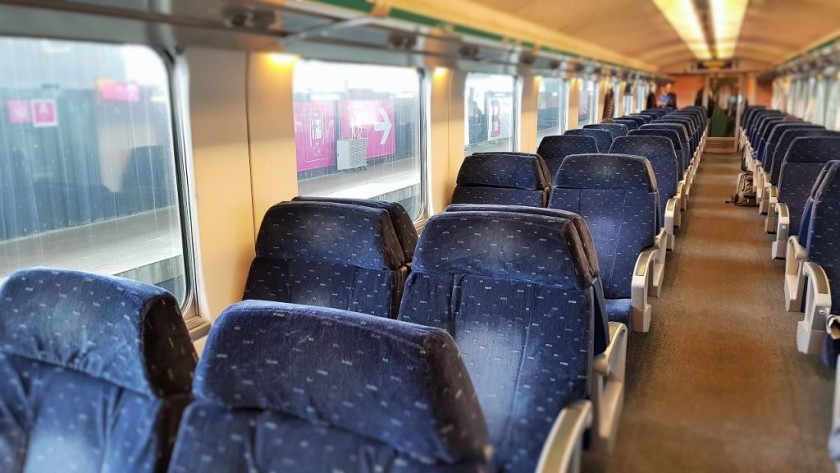
On the majority of Belgian trains the difference between first and second class seats can be comparatively marginal, with more legroom being the only on board benefit.
Though on most of the trains used on the Ostend – Bruges – Ghent – Brusses – Liege – Eupen route, the first class seating is 2 + 1 across the aisle.
Reservations are not available on Belgian trains, including the IC express services, so a key benefit of booking first class tickets is the greater likelihood of being able to find available seats
Czechia
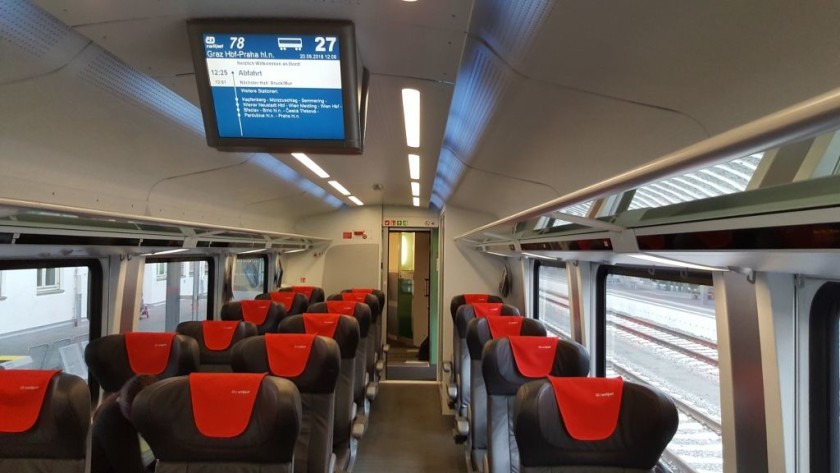
When travelling by express (SC, IC and EC) trains in Czechia there is a clear distinction between travelling first and second class.
The national rail operator, CD, provides different types of train services and each of them has a distinct first class offering.
- On the SC trains on the primary Praha ↔ Ostrava route a complimentary light meal is served in first class.
- On the Railjet trains used on the Praha – Brno – Breclav – (Austria route) the the first class benefits include:
- reclining seats
- power sockets at every seat
- access to on board entertainment portal + Wifi
- a quiet zone; the standard / second class seats don’t have one
- the full on-board restaurant menu can be ordered from the attendant and delivered to your seat; though no food and drink is complimentary.
On the LeoExpress and Regiojet trains, which compete with CD’s services, travelers who book their equivalents of First Class receive a complimentary welcome drink and snack.
Denmark
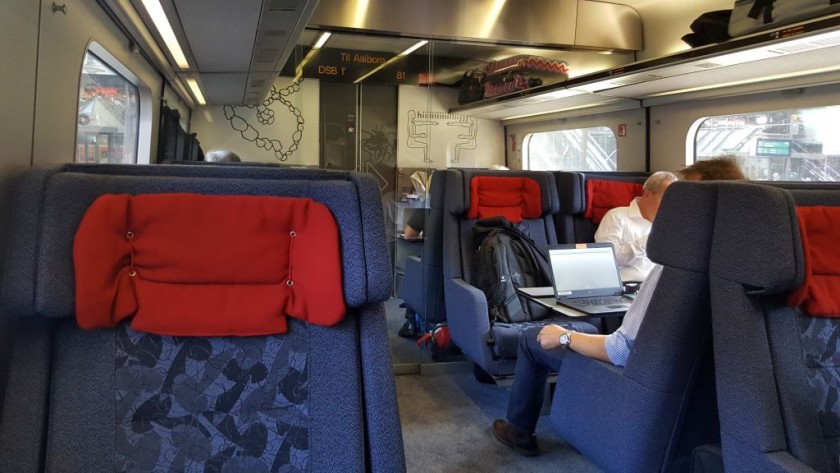
In Denmark, on the trains used on the Lyn and IC services, as well as the international trains to/from Hamburg, there are three key differences between the first and second class seating saloons:
- The seats are larger in first class and they have more legroom
- The seats are arranged 2 + 1 across the aisle
- Complimentary jugs of hot water are provided so that travelers can help themselves to tea and coffee, plus bottles of cold water and snacks are available.
France
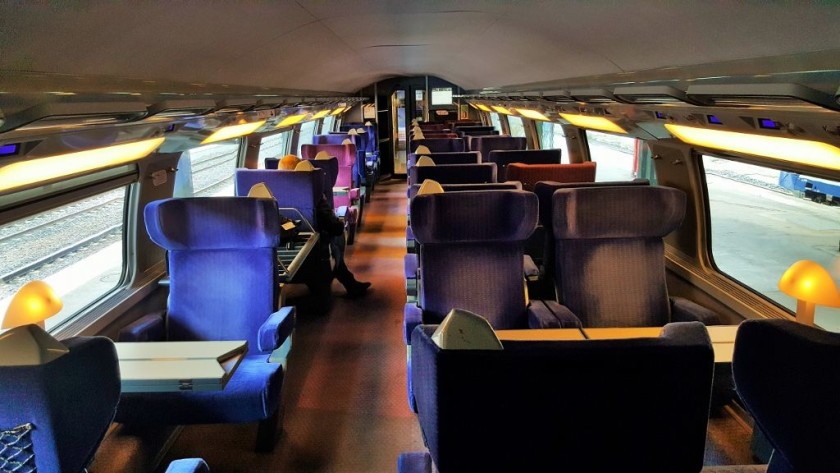
On the TGV trains and the Intercités services the key difference between premiere /first class and standard / second class is the ambience in the on-board seating saloons.
- The seats are arranged 2 + 1 across the aisle, so it can be worth using the seating plans when making a booking.
- The seats are larger and offer more legroom and it’s this in particular which can justify the additional cost; I am 1.9 meters tall and find the Standard Class seating saloons on TGV and Intercités trains to be comparatively cramped.
- There are also more luggage racks and space in which to store luggage generally.
Though what is comparatively unusual in France is that there are no complimentary catering benefits with first class tickets.
Also Premiere Class tickets do not provide access to station lounges; these are one of the two key benefits of booking Business Premiere tickets, the other being the greater flexibility in terms of ticket refund and cancellations.
Germany
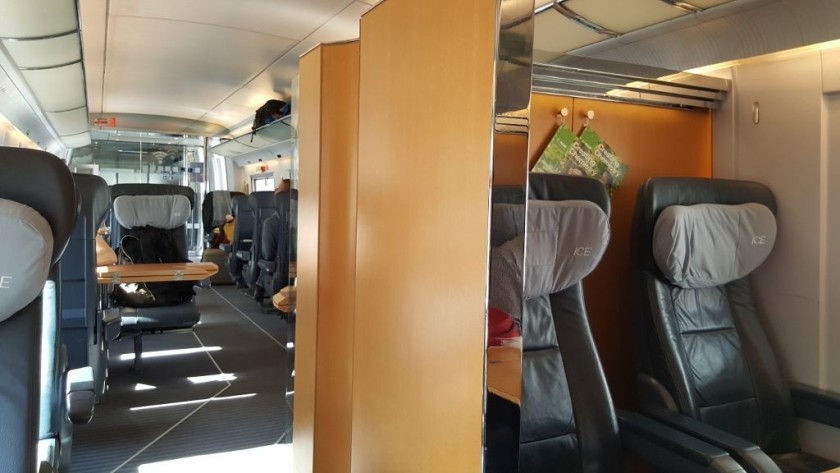
On the iconic ICE trains the benefits which are only available to first class ticket holders are:
- seats arranged 2 + 1 across the aisle
- enhanced wi-fi
- the full on-board restaurant menu can be ordered from the attendant and delivered to your seat; though no food and drink is complimentary.
Holders of first class tickets can also access the lounges which are available at every hauptbahnhof (main station).
Great Britain
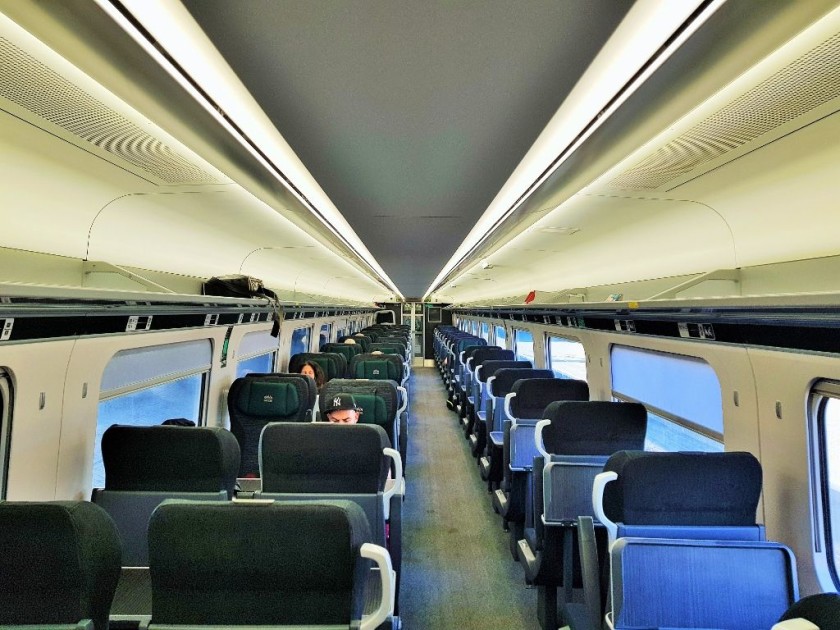
On British long-distance rail services it is the operators of the trains which set the level of first class service; so you can use this guide as to what they offer; and this guide which will you on which routes you’ll find their trains.
Though in summary, when travelling with the companies which operate the ‘commuter routes’ to/from London including Greater Anglia, Southern and South West Railways, the key benefits of travelling first class are the enhanced legroom and the increased likelihood of finding available seats when boarding.
On the trains operated by Avanti West Coast, GWR and LNER a key additional benefit of travelling first class is the at-seat complimentary catering, which on some departures can be three course hot meals, similar to what would be served in the restaurant cars on other European trains.
Italy
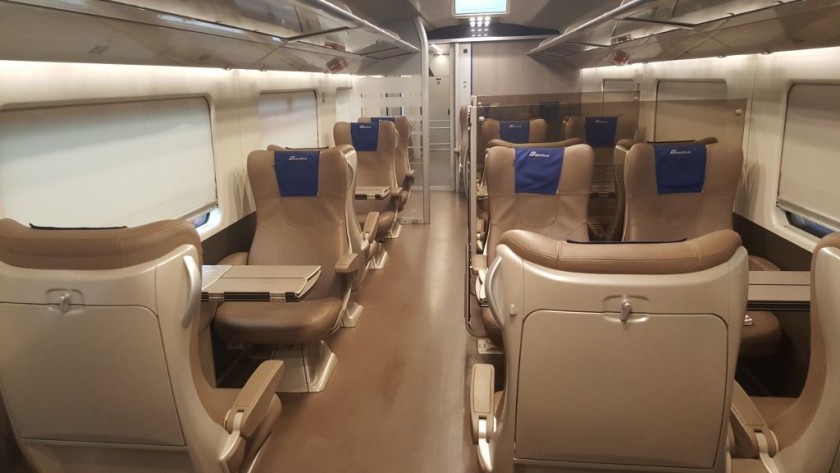
On the Frecce and the Intercity trains operated by Trenitalia and the Italo trains operated by NTV, the primary benefit of booking first class tickets is the enhanced comfort, though what is unusual about the Frecciarossa 500; the Freciarossa 1000 and Italo trains is that they offer four class of accommodation instead of two.
There is a distinct contrast between the standard /second class and Business / Prima Class seating saloons on these trains; these Business / Prima classes are closest to the equivalent of first class areas of other European high speed trains.
On Trenitalia’s Frecce trains a complimentary welcome drink and snack is served in Business Class, but you have to travel in Executive Class on the Frecciarossa 500 and Freciarossa 1000 trains to have access to an at seat catering service.
Though a less obvious benefit of the Business and Executive Class on those Frecce trains, as well as in the Prima and Business Classes on the Italo trains, is the additional luggage storage space.
Poland
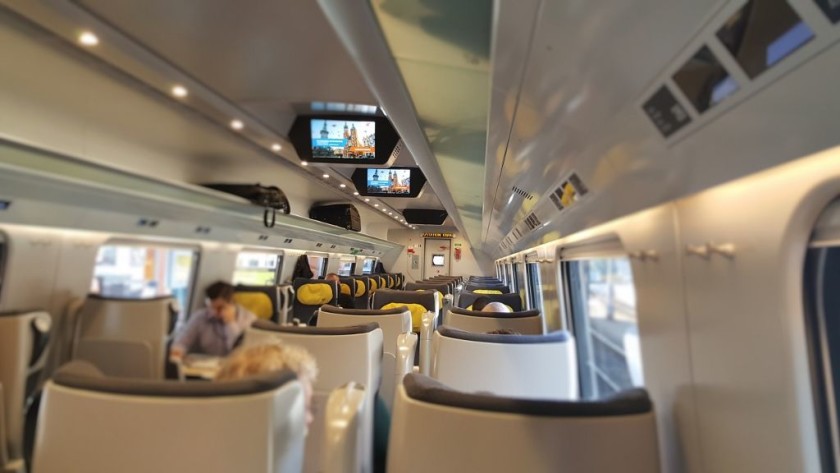
PKP manages the national express train services in Poland and on its EIC and EIP services the difference between travelling first and second class is comparatively obvious.
On the EIP trains a light meal service is complimentary and the full restaurant menu is also available as an at-seat service.
On the EIC trains the complimentary light meal isn’t served, but the full on board menu can be ordered from the catering attendant.
Portugal
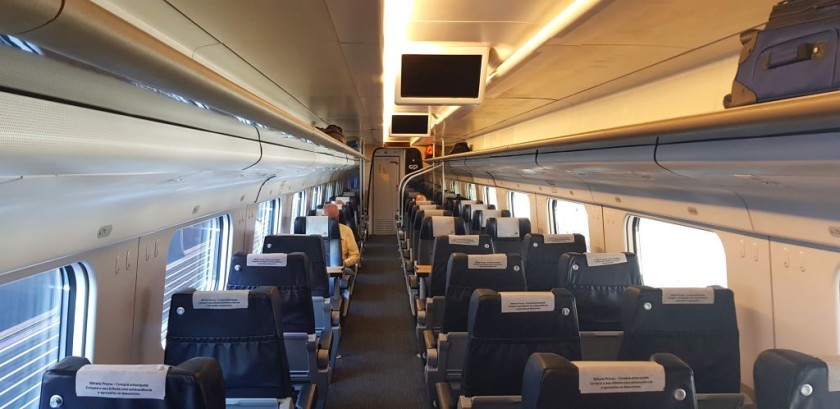
CP manages the national express train services in Portugal and on its express AP and IC services the difference between travelling first and second class is comparatively obvious.
However, the difference is solely based on the ambience on the train.
There are fewer seats in Conforto Class on the Alfa Pendular (AP) and Intercidades (IC) trains, as they are arranged 2+1 across the aisle instead of 2+2 .
So there is more space per passenger in the Conforto Class saloons, despite the additional space for luggage.
Spain
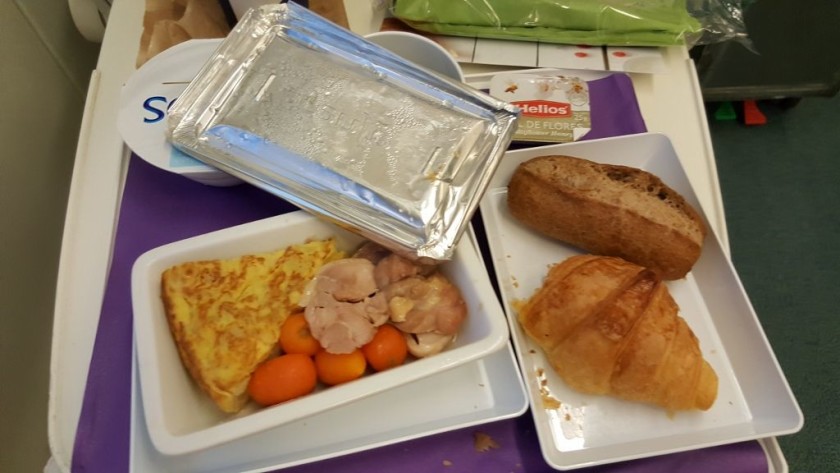
Prémium tickets are only available on Monday to Friday on the AVE and the Euromed services, because if you book one of these tickets you will be served a complimentary light meal at your seat, but this meal service is not available at weekends.
On these AVE and Euromed trains and the Alvia express services, ‘Elige’ tickets can be ‘upgraded to travel in Comfort Class, which is the equivalent of 1st Class.
So when travelling on the AVE and Euromed services on Monday to Friday, if you want to travel in Comfort Class, you can either upgrade an Elige ticket, or book a Premium ticket; both tickets give access to the same seating areas.
When upgrading an Elige ticket to Comfort Class you are primarily paying for the enhanced on-board comfort; wider seats arranged 2+1 across the aisle and more legroom.
Switzerland
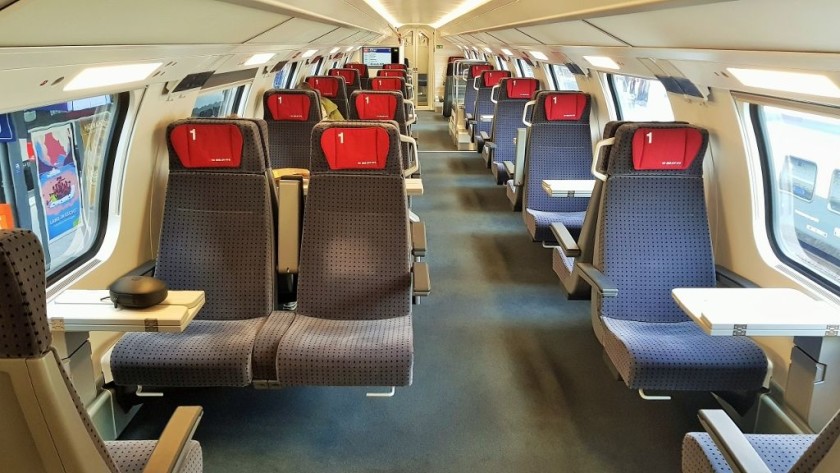
On the Swiss IC and IR train services the contrast between first and second class is only particularly stark on the older single deck trains, but aside from the wider seats and additional legroom, the core benefit of booking first class can be the enhanced possibility of finding spare seats on busy trains
Comparatively few Swiss train travelers bother to make reservations, as booking them is an extra cost and the process is outside of the usual booking path.
But as first class is less busy generally, finding available seats on any departure is virtually guaranteed.
Despite the inclusion of restaurant cars on the IC services, an at seat meal service is not available in first class.
The Netherlands
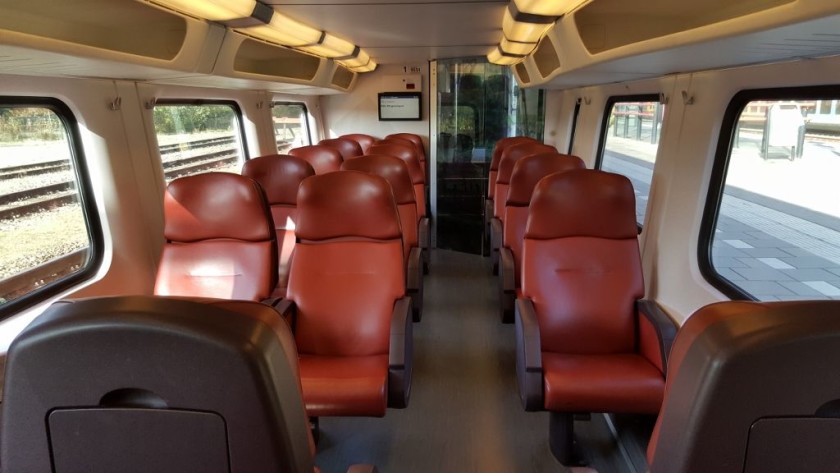
On the majority of Dutch trains the difference between first and second class seats can be comparatively marginal, with more legroom being the only on board benefit.
Reservations are not available on Dutch trains, including the IC express services, so a key benefit of booking first class tickets is the greater likelihood of being able to find available seats.
International services:
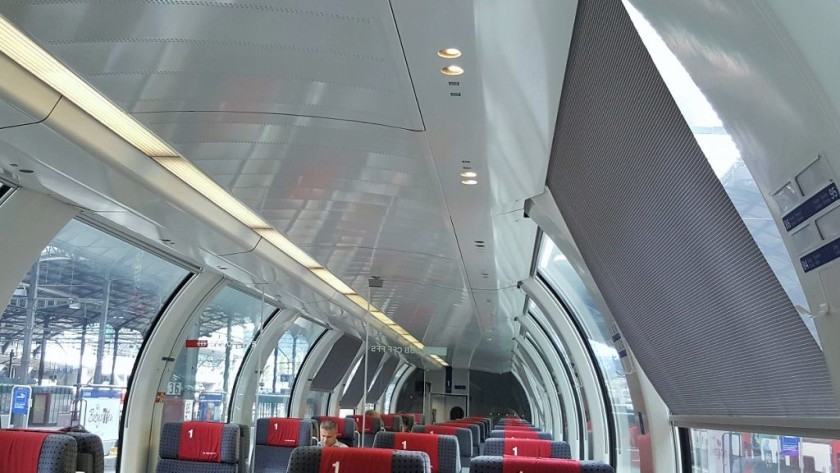
These international train services offer additional benefits to travelling in enhanced comfort; wider seats, more leg-room, seats arranged 2+1 across the aisle:
On the routes between Paris and Frankfurt (Main), Stuttgart and Munich passengers travelling first class can access an at seat catering service; though on the ICE trains used for some departures on the Paris ↔ Frankfurt (Main) route the choice is more extensive, as these trains have restaurant cars
EC (Switzerland - Germany/Austria)
On the EC trains which operate on the Zurich ↔ Graz and the Switzerland ↔ north Germany via Koblenz and Bonn routes, some of the first class seating is in observation cars.
On the Eurostar services both Standard Premier and Business Premier ticket holders are served a complimentary light meal and there is no difference to the on-board ambience.
The core additional benefits of Business Premier tickets are:
- shorter check-in times
- enhanced options for altering a booking
- access to the station lounges.
On the Lyria train services between Paris and Switzerland and on the Thalys train services between Paris and Belgium, Germany and The Netherlands, a complimentary light meal is served to Business Class ticket holders.
Please support ShowMeTheJourney
This second version of ShowMeTheJourney is exciting and new, so we are genuinely thrilled that you are here and reading this, but we also need your help.
We’re striving not to let anything get in the way of providing the most useful service possible, hence a facility has been set up with DonorBox which can be used to support the running costs and make improvements.
Instead of advertising or paywalls, your financial support will make a positive difference to delivering an enhanced service, as there’s a lot of ideas which we want to make happen.
So if you have found the info provided here to be useful, please go here to say thank you.
Look for a journey guide

Simon Harper
I wanted to share my passion for train travel and explain how anyone can take the fantastic journeys I have taken.

This is one of more than 100 train travel guides available on ShowMeTheJourney, which will make it easier to take the train journeys you want or need to make. As always, all images were captured on trips taken by ShowMeTheJourney.
This second version of ShowMeTheJourney is exciting and new, so we are genuinely thrilled that you are here and reading this, but we also need your help.
We’re striving not to let anything get in the way of providing the most useful service possible, hence a facility has been set up with DonorBox which can be used to support the running costs and make improvements.
Instead of advertising or paywalls, your financial support will make a positive difference to delivering an enhanced service, as there’s a lot of ideas which we want to make happen.
So if you have found the info provided here to be useful, please consider saying thank you.





